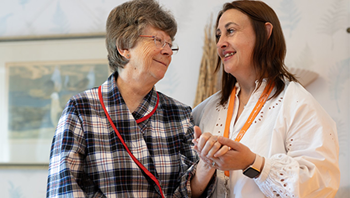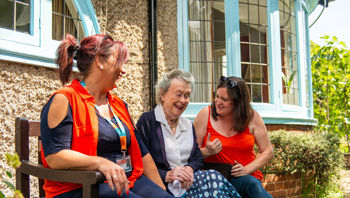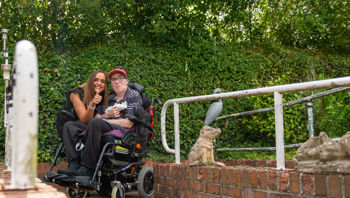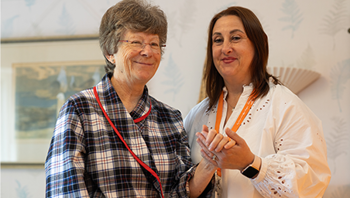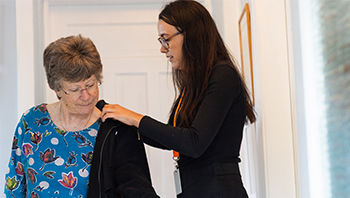
What Are the Benefits of Pets for Older Adults & People Living with Disabilities?
Published: 26/07/2024
At Right at Home, we’ve spent many years providing exceptional support in the social care sector, and we have witnessed the impact that pets can have on the lives of older adults and individuals living with disabilities and complex conditions.
Pets provide more than just companionship; they offer emotional support, physical health benefits, and cognitive stimulation that can significantly enhance the quality of life.
In this blog post, we’ll explore these benefits, backed by research, to illustrate why pets can be an invaluable addition to the lives of many of those we care for and how our homecare services can facilitate this.
Emotional & Psychological Benefits
Reducing Loneliness & Depression
Loneliness and depression are common issues among older adults and people with disabilities. A study by the University of California, Davis found that pets can significantly reduce feelings of loneliness and depression. The simple act of petting a dog or cat releases endorphins, the body's natural "feel-good" chemicals, which help improve mood and reduce stress.
Pets also provide a non-judgmental presence, offering unconditional love and companionship. This is especially beneficial for those who may not have regular social interactions, providing a sense of connection and reducing feelings of isolation.
In addition, pets can be excellent social facilitators. They provide a common topic of conversation and can help break the ice in social situations. This is particularly valuable for older adults and individuals with disabilities who might struggle with social isolation. According to a study in the journal Social Science & Medicine, pet owners are more likely to engage in social interactions and develop new friendships, contributing to a stronger support network and improved mental health.
Providing a Sense of Purpose
Caring for a pet gives individuals a daily routine and a sense of responsibility. According to research published in the journal Aging & Mental Health, older adults who own pets often report a greater sense of purpose and meaning in their lives. The daily tasks of feeding, grooming, and walking a pet provide structure and can help combat feelings of purposelessness that sometimes accompany ageing or disability.
Physical & Cognitive Health Benefits
Encouraging Physical Activity
Regular physical activity is essential for maintaining health and mobility, particularly for older adults. Owning a pet, especially a dog, encourages regular walks and outdoor activities. The American Heart Association has linked pet ownership with a reduced risk of heart disease, attributing this to the increased physical activity that comes with walking a dog.
For those with mobility issues, even gentle activities such as playing with a pet or taking short walks can improve physical fitness and mobility. These activities help maintain muscle tone, joint flexibility, and overall physical health. It also means you get out of the house, helping you maintain independence and enjoy local green spaces on your doorstep.
Stimulating Cognitive Function
For people living with dementia or Alzheimer’s disease, pets can offer much-needed cognitive stimulation. The Alzheimer’s Association has reported that interacting with animals can reduce agitation and improve mood in dementia patients. The routine involved in pet care—such as feeding and grooming—requires planning and memory use, which can help keep the mind active.
Enhancing Overall Quality of Life
Improving Emotional Stability
The emotional stability that pets provide is a cornerstone of their benefits. The presence of a pet can offer comfort during times of stress or sadness. A study in the Journal of Personality and Social Psychology found that pet owners reported feeling less stressed and more emotionally stable than non-pet owners. The routine and companionship provided by pets can create a more predictable and secure environment, which is particularly beneficial for individuals with anxiety disorders.

L I | Daughter of Client"My father had wanted to remain at home and he also had an elderly dog, so this too was an aspect that needed consideration. We felt safe with the arrangement and knew if we required a higher level of care, the service could be increased when required – all-round exceptional care."
How Can Right at Home Help With Your Pets?
While the benefits of pet ownership are clear, it’s important to consider the practical aspects. Not all individuals may be able to care for a pet independently, especially those with severe disabilities or advanced age. In such cases, family members, CareGivers, or professional pet care services can provide the necessary support to ensure that both the individual and the pet are well-cared for.
At Right at Home, we have seen the transformative power of pets in enhancing the lives of older adults and people living with disabilities and complex conditions. The companionship, emotional support, physical health benefits, cognitive stimulation, and social interaction that pets provide are invaluable.
We are committed to enhancing the quality of life for all our Clients through home care, and we believe that pets can be a significant part of that journey.
When your health declines, you may worry about what will happen to a pet, particularly if you require additional support with tasks. If you choose residential care, there is a good possibility that you will be unable to take your pet with you, causing unnecessary distress for both of you.
However, by choosing a homecare company like Right at Home, you can receive exceptional care in your own home, which also extends to your beloved furry friend. Our CareGivers help with housekeeping and similar chores around the house, which can include feeding your pets, ensuring they attend veterinary appointments and even taking them for walks.
Our dedicated in-home care service allows Clients to remain with their animal companions, as well as maintain independence and enjoy a better quality of life with their pet at their side.
